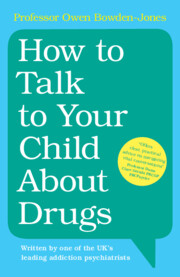Book contents
- How to Talk to Your Child About Drugs
- How to Talk to Your Child About Drugs
- Copyright page
- Contents
- Acknowledgements
- Introduction
- 1 What Are Psychoactive Drugs, Who Uses Them and Why?
- 2 Understanding Adolescence
- 3 Having the Drug Conversation with Your Child
- 4 Drugs and the Brain
- 5 How Do Drugs Cause Harm?
- 6 Types of Drugs
- 7 Rise of the Synthetics
- 8 Legal but Harmful: Prescription Medications, Tobacco, Vaping and Alcohol
- 9 Behavioural Addictions
- 10 Detecting Drug Use and What to Do about It
- 11 Treatment and Recovery
- 12 Final Thoughts
- Useful Resources
- References
- Index
11 - Treatment and Recovery
Published online by Cambridge University Press: 13 February 2025
- How to Talk to Your Child About Drugs
- How to Talk to Your Child About Drugs
- Copyright page
- Contents
- Acknowledgements
- Introduction
- 1 What Are Psychoactive Drugs, Who Uses Them and Why?
- 2 Understanding Adolescence
- 3 Having the Drug Conversation with Your Child
- 4 Drugs and the Brain
- 5 How Do Drugs Cause Harm?
- 6 Types of Drugs
- 7 Rise of the Synthetics
- 8 Legal but Harmful: Prescription Medications, Tobacco, Vaping and Alcohol
- 9 Behavioural Addictions
- 10 Detecting Drug Use and What to Do about It
- 11 Treatment and Recovery
- 12 Final Thoughts
- Useful Resources
- References
- Index
Summary
There are many different treatments and recovery services available. The best ones combine psychological treatment, social intervention and (where appropriate) medication.
Ask services to explain the treatments they think will work for your child.
The better the service understands your child, the better they will be able to help. Share all the information you have.
It is important that your child can be open and honest with the professionals. This may mean that not everything is shared with you.
- Type
- Chapter
- Information
- How to Talk to Your Child About Drugs , pp. 215 - 237Publisher: Cambridge University PressPrint publication year: 2025

